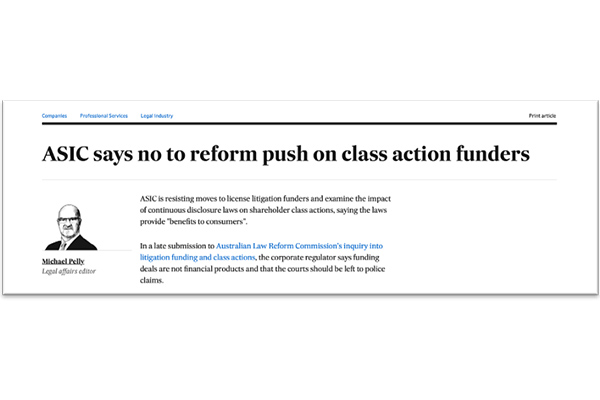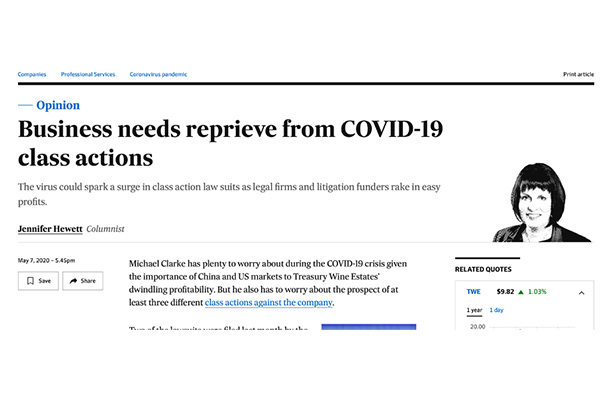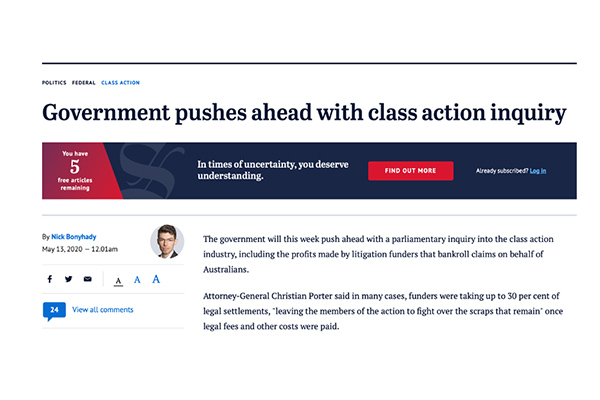
SHAREHOLDER CLASS ACTIONS IN THE SPOTLIGHT
THE PROS OF SHAREHOLDER CLASS ACTIONS:
From a consumer and small business perspective, there are significant advantages in collective redress both in terms of availability, costs and speed of obtaining a remedy when compared to private litigation.
There has also been growing acceptance of shareholder class actions by the Australian investment community, particularly among institutional investors.
While not usually taking the role of lead plaintiff, the size of many institutional holdings in major listed companies means that institutional participation in class actions is increasing. This, in turn, has increased the potential exposure associated with many shareholder class actions.
THE CONS OF SHAREHOLDER CLASS ACTIONS:
1. Legal and economic impacts of continuous disclosure obligations of material information to the market.
a. Increasing scarcity of Directors and Officers insurance
b. Disincentive for qualified people to become non-executive directors of listed companies
2. The prevalence of shareholder class actions has led to:
a. increased volatility in equity markets
b. growth in the third-party litigation funding market and rise in institutional participation.
Claims are often raised off the back of the following examples:
-
Prospectus, information memoranda or capital raising statements – allegations focus on failures to disclose likely impacts under ‘foreseeable’ scenarios – e.g. the loss of a significant contract, a change in government conditions, break-down or non-availability of key equipment / resources.
-
Misleading revenue, profit and/or production forecasts – often a claim will allege new disclosable information came to light suggesting changes to current forecasts should be made and the company did not immediately disclose the information claiming the information was insufficiently definite to warrant disclosure such that it fell within the carve out under ASX Listing Rule 3.1A.1.
-
Financial / covenant / metrics – claims may arise if review events or events of default under a company’s finance facilities are triggered or likely to be triggered and disclosure is not made.
-
Accounting treatments – claims can focus on the use of particular accounting treatments around revenue or profit if the market was expecting gains from underlying operations and/or underlying cash-flow, rather than gains from mere accounting adjustments.
OPPOSED TO REFORM: ALRC & ASIC
ALRC report “Integrity, Fairness and Efficiency, An Inquiry into Class Action Proceedings and Third-Party Litigation Funders, 2018”.
The ALRC left the regulation and oversight of litigation funders, the domain of the courts, not the government, rejecting calls for a licensing regime.
ASIC – RESISTS LICENSING REQUIREMENT FOR LITIGATION FUNDERS

ASIC resists pressure to license litigation funders and/or to review continuous disclosure laws for shareholder class actions, saying the laws provide “benefits to consumers”.
1. ASIC resists implementing a licensing regime for litigation funding
-
Litigation funding “should be regulated as a legal service as it is more closely aligned with the provision of legal services and the administration of justice, than with the provision of financial products and services”.
-
“We consider the courts are better placed to regulate litigation funders, through court rules and procedure, oversight and security for costs.”
-
In a late submission to Australian Law Reform Commission’s inquiry into litigation funding and class actions, the corporate regulator says funding deals are not financial products and that the courts should be left to police claims.
-
Litigation funding poses a low-risk and is a low-priority for the regulator;
-
“Further, given ASIC’s risk-based approach to regulation, it seems unlikely such an area would be a main focus of our work even if we had jurisdiction for it.”
-
“Risks as may exist in relation to litigation funders are better addressed through other mechanisms – for example, court-ordered security for costs.”
2. ASIC resists review of continuous disclosure laws
-
Shareholder class actions “provide a number of benefits to consumers and financial markets and play an important role in improving shareholder access to justice”.
BUSINESSES ARE SEEKING A SAFE-HAVEN FROM CLASS ACTIONS
Australian corporates, already concerned about the rapid rise of shareholder class actions, now fear the COVID-19 crisis will lead to a further upsurge just when they are most vulnerable.

COVID 19 & CONTINUOUS DISCLOSURE FOR SHAREHOLDER CLASS ACTIONS
While ASX confirmed that a listed entity’s continuous disclosure obligations do not extend to predicting the unpredictable, the legal position on continuous disclosure remains the same.
Shareholder class actions make up the lion’s share of class action proceedings in Australia, which has led to the following by-products: increased scarcity of Directors & Officers Insurance; the disincentive for qualified people to become non-executive directors of listed companies, particularly small ones.
It’s why groups like the Australian Institute of Company Directors and the Business Council of Australia are asking for immediate action from the government to provide a temporary safe harbour from potential class action suits related to COVID-19.
In its latest compliance update, ASX reiterated that entities in financial difficulty (including with respect to their debt arrangements) will receive no special treatment. On earnings guidance, it was acknowledged that many listed entities have taken the opportunity to withdraw guidance issued before the outbreak of COVID-19.
Disclosure is required if and when an entity becomes aware of information that a reasonable person would expect to have a material effect on the price or value of its securities, including further impacts arising from COVID-19. As such, entities must carefully and continuously consider the impacts of COVID-19 and ensure that changing circumstances are assessed, and analysis is updated.
ASX also strongly encouraged entities to review their published guidance in light of COVID-19 and to either update it if it was not current or withdraw it in this highly uncertain climate.
CLASS PR COMMENT:
The uncertainty about the virus makes it almost impossible to provide guidance that could not be challenged later – particularly given the financial rewards on offer. It is, however, questionable whether the ASX’s direction that companies limit disclosures due to COVID-19 related uncertainty is a short-term fix at best.
THE IMPLICATIONS OF RECENTLY DECIDED
TPT Patrol Pty Ltd as trustee for Amies Superannuation Fund v Myer Holdings Limited [2019] FCA 1747, February 2020.
Below is taken from Damian Grave, class action partner at Freehills: Background: The case stems from statements made by Myer’s then-chief executive Bernie Brookes in September 2014, when he said that the department-store giant’s net profit for the year was expected to be more than the $98.5m tallied by the company in the prior financial year. In March 2015, Myer said that profits for fiscal 2015 would probably be less than in 2014, at between $75m and $80m. When it finally released full-year results, it reported profits of $77.5m for fiscal 2015. Despite Myer’s breach of continuous disclosure obligations by failing to correct Brooke’s statement between September 2014 and March 2015, the judge said that he was “not convinced that the applicant and group members have suffered any loss flowing from such contraventions” since the market already priced into the company’s share price a net profit after tax that was significantly below the upbeat picture painted by Brookes. Decision: “The decision is the first decision of a superior court in Australia which has accepted the availability of a market-based theory of causation in the context of a securities class action,” Grave said. The acceptance of market-based causation means plaintiff will not need to prove every single class member relied on a misstatement. “While the court found that Myer contravened the continuous disclosure and misleading or deceptive conduct provisions in the Corporations Act, it also found that the applicant and group members may not have suffered any loss flowing from Myer’s contraventions,” Grave said. “The decision shows that there are still risks for shareholders in these types of matters given that the court found that in the circumstances of this case, no loss may have been established.”
CLASS PR COMMENT:
The Myer decision reinforces the importance of maintaining a culture of continuous disclosure.

The parliamentary joint committee on corporations and financial services will conduct the inquiry, which will examine topics such as whether litigation funders should be licensed.
The Labor government, though opposed to the inquiry, has been unable to block it. The inquiry, which was originally announced in March but delayed by the coronavirus outbreak, will now also include how class actions might hurt “vulnerable Australian businesses” already under pressure due to the pandemic.
Criticism of the parliamentary inquiry:
The inquiry follows the Australian Law Reform Commission, Victorian Law Reform Commission and Productivity Commission’s finding that the industry was not in need of substantive reform, with respect to shareholder class actions and litigation funding.
“They haven’t liked the independent umpires’ answer so now they’re going to appoint themselves the referee,” Mr Watson said of the Coalition’s planned inquiry. – Andrew Watson, head of class actions at Maurice Blackburn.
Bill Shorten, Labor’s spokesman for government services, said the government was opposed to class actions because its so-called “robo-debt” scheme, which aims to recover tens of millions of dollars from welfare recipients, is the subject of one.
“Class actions like robo-debt are sometimes the only way the underdog can get some sort of justice against the rich and powerful,” Mr Shorten said.
But it’s just a myth to say that funders are backing unmeritorious claims because it’s their money that’s on the line at the end of the day.”
“Policy reform in this area should not be driven by exaggerated and misleading claims regarding the number of class actions, the level of settlements or the costs of directors’ and officers’ insurance.”
Labor’s legal affairs spokesman, Mark Dreyfus, said the inquiry was an attempt to justify legislation restricting class actions and protecting the government’s “big business mates”.The Morrison government’s inquiry into class actions and litigation funding is a shameless move towards denying justice and fair compensation for ordinary Australians,” Mr Dreyfus said.
CLASS PR CONCLUSION:
There is no doubt that both litigation funding and continuous disclosure laws play an essential role in protecting consumers.
Both the ALRC and ASIC considered the aforementioned issues from an industry specific standpoint and determined that the status quo, supplemented with increased court oversight, is in the public’s best interest.
The objectives of the parliamentary inquiry appear to be directed towards the interests of ASX listed corporations, with whom the government has close ties, rather than those of the Australian public.

SHAREHOLDER CLASS ACTIONS IN THE SPOTLIGHT
THE PROS OF SHAREHOLDER CLASS ACTIONS:
From a consumer and small business perspective, there are significant advantages in collective redress both in terms of availability, costs and speed of obtaining a remedy when compared to private litigation.
There has also been growing acceptance of shareholder class actions by the Australian investment community, particularly among institutional investors.
While not usually taking the role of lead plaintiff, the size of many institutional holdings in major listed companies means that institutional participation in class actions is increasing. This, in turn, has increased the potential exposure associated with many shareholder class actions.
THE CONS OF SHAREHOLDER CLASS ACTIONS:
1. Legal and economic impacts of continuous disclosure obligations of material information to the market.
a. Increasing scarcity of Directors and Officers insurance
b. Disincentive for qualified people to become non-executive directors of listed companies
2. The prevalence of shareholder class actions has led to:
a. increased volatility in equity markets
b. growth in the third-party litigation funding market and rise in institutional participation.
Claims are often raised off the back of the following examples:
-
Prospectus, information memoranda or capital raising statements – allegations focus on failures to disclose likely impacts under ‘foreseeable’ scenarios – e.g. the loss of a significant contract, a change in government conditions, break-down or non-availability of key equipment / resources.
-
Misleading revenue, profit and/or production forecasts – often a claim will allege new disclosable information came to light suggesting changes to current forecasts should be made and the company did not immediately disclose the information claiming the information was insufficiently definite to warrant disclosure such that it fell within the carve out under ASX Listing Rule 3.1A.1.
-
Financial / covenant / metrics – claims may arise if review events or events of default under a company’s finance facilities are triggered or likely to be triggered and disclosure is not made.
-
Accounting treatments – claims can focus on the use of particular accounting treatments around revenue or profit if the market was expecting gains from underlying operations and/or underlying cash-flow, rather than gains from mere accounting adjustments.
OPPOSED TO REFORM: ALRC & ASIC
ALRC report “Integrity, Fairness and Efficiency, An Inquiry into Class Action Proceedings and Third-Party Litigation Funders, 2018”.
The ALRC left the regulation and oversight of litigation funders, the domain of the courts, not the government, rejecting calls for a licensing regime.
ASIC – RESISTS LICENSING REQUIREMENT FOR LITIGATION FUNDERS

ASIC resists pressure to license litigation funders and/or to review continuous disclosure laws for shareholder class actions, saying the laws provide “benefits to consumers”.
1. ASIC resists implementing a licensing regime for litigation funding
-
Litigation funding “should be regulated as a legal service as it is more closely aligned with the provision of legal services and the administration of justice, than with the provision of financial products and services”.
-
“We consider the courts are better placed to regulate litigation funders, through court rules and procedure, oversight and security for costs.”
-
In a late submission to Australian Law Reform Commission’s inquiry into litigation funding and class actions, the corporate regulator says funding deals are not financial products and that the courts should be left to police claims.
-
Litigation funding poses a low-risk and is a low-priority for the regulator;
-
“Further, given ASIC’s risk-based approach to regulation, it seems unlikely such an area would be a main focus of our work even if we had jurisdiction for it.”
-
“Risks as may exist in relation to litigation funders are better addressed through other mechanisms – for example, court-ordered security for costs.”
2. ASIC resists review of continuous disclosure laws
-
Shareholder class actions “provide a number of benefits to consumers and financial markets and play an important role in improving shareholder access to justice”.
BUSINESSES ARE SEEKING A SAFE-HAVEN FROM CLASS ACTIONS
Australian corporates, already concerned about the rapid rise of shareholder class actions, now fear the COVID-19 crisis will lead to a further upsurge just when they are most vulnerable.

COVID 19 & CONTINUOUS DISCLOSURE FOR SHAREHOLDER CLASS ACTIONS
While ASX confirmed that a listed entity’s continuous disclosure obligations do not extend to predicting the unpredictable, the legal position on continuous disclosure remains the same.
Shareholder class actions make up the lion’s share of class action proceedings in Australia, which has led to the following by-products: increased scarcity of Directors & Officers Insurance; the disincentive for qualified people to become non-executive directors of listed companies, particularly small ones.
It’s why groups like the Australian Institute of Company Directors and the Business Council of Australia are asking for immediate action from the government to provide a temporary safe harbour from potential class action suits related to COVID-19.
In its latest compliance update, ASX reiterated that entities in financial difficulty (including with respect to their debt arrangements) will receive no special treatment. On earnings guidance, it was acknowledged that many listed entities have taken the opportunity to withdraw guidance issued before the outbreak of COVID-19.
Disclosure is required if and when an entity becomes aware of information that a reasonable person would expect to have a material effect on the price or value of its securities, including further impacts arising from COVID-19. As such, entities must carefully and continuously consider the impacts of COVID-19 and ensure that changing circumstances are assessed, and analysis is updated.
ASX also strongly encouraged entities to review their published guidance in light of COVID-19 and to either update it if it was not current or withdraw it in this highly uncertain climate.
CLASS PR COMMENT:
The uncertainty about the virus makes it almost impossible to provide guidance that could not be challenged later – particularly given the financial rewards on offer. It is, however, questionable whether the ASX’s direction that companies limit disclosures due to COVID-19 related uncertainty is a short-term fix at best.
THE IMPLICATIONS OF RECENTLY DECIDED
TPT Patrol Pty Ltd as trustee for Amies Superannuation Fund v Myer Holdings Limited [2019] FCA 1747, February 2020.
Below is taken from Damian Grave, class action partner at Freehills: Background: The case stems from statements made by Myer’s then-chief executive Bernie Brookes in September 2014, when he said that the department-store giant’s net profit for the year was expected to be more than the $98.5m tallied by the company in the prior financial year. In March 2015, Myer said that profits for fiscal 2015 would probably be less than in 2014, at between $75m and $80m. When it finally released full-year results, it reported profits of $77.5m for fiscal 2015. Despite Myer’s breach of continuous disclosure obligations by failing to correct Brooke’s statement between September 2014 and March 2015, the judge said that he was “not convinced that the applicant and group members have suffered any loss flowing from such contraventions” since the market already priced into the company’s share price a net profit after tax that was significantly below the upbeat picture painted by Brookes. Decision: “The decision is the first decision of a superior court in Australia which has accepted the availability of a market-based theory of causation in the context of a securities class action,” Grave said. The acceptance of market-based causation means plaintiff will not need to prove every single class member relied on a misstatement. “While the court found that Myer contravened the continuous disclosure and misleading or deceptive conduct provisions in the Corporations Act, it also found that the applicant and group members may not have suffered any loss flowing from Myer’s contraventions,” Grave said. “The decision shows that there are still risks for shareholders in these types of matters given that the court found that in the circumstances of this case, no loss may have been established.”
CLASS PR COMMENT:
The Myer decision reinforces the importance of maintaining a culture of continuous disclosure.

The parliamentary joint committee on corporations and financial services will conduct the inquiry, which will examine topics such as whether litigation funders should be licensed.
The Labor government, though opposed to the inquiry, has been unable to block it. The inquiry, which was originally announced in March but delayed by the coronavirus outbreak, will now also include how class actions might hurt “vulnerable Australian businesses” already under pressure due to the pandemic.
Criticism of the parliamentary inquiry:
The inquiry follows the Australian Law Reform Commission, Victorian Law Reform Commission and Productivity Commission’s finding that the industry was not in need of substantive reform, with respect to shareholder class actions and litigation funding.
“They haven’t liked the independent umpires’ answer so now they’re going to appoint themselves the referee,” Mr Watson said of the Coalition’s planned inquiry. – Andrew Watson, head of class actions at Maurice Blackburn.
Bill Shorten, Labor’s spokesman for government services, said the government was opposed to class actions because its so-called “robo-debt” scheme, which aims to recover tens of millions of dollars from welfare recipients, is the subject of one.
“Class actions like robo-debt are sometimes the only way the underdog can get some sort of justice against the rich and powerful,” Mr Shorten said.
But it’s just a myth to say that funders are backing unmeritorious claims because it’s their money that’s on the line at the end of the day.”
“Policy reform in this area should not be driven by exaggerated and misleading claims regarding the number of class actions, the level of settlements or the costs of directors’ and officers’ insurance.”
Labor’s legal affairs spokesman, Mark Dreyfus, said the inquiry was an attempt to justify legislation restricting class actions and protecting the government’s “big business mates”.The Morrison government’s inquiry into class actions and litigation funding is a shameless move towards denying justice and fair compensation for ordinary Australians,” Mr Dreyfus said.
CLASS PR CONCLUSION:
There is no doubt that both litigation funding and continuous disclosure laws play an essential role in protecting consumers.
Both the ALRC and ASIC considered the aforementioned issues from an industry specific standpoint and determined that the status quo, supplemented with increased court oversight, is in the public’s best interest.
The objectives of the parliamentary inquiry appear to be directed towards the interests of ASX listed corporations, with whom the government has close ties, rather than those of the Australian public.



